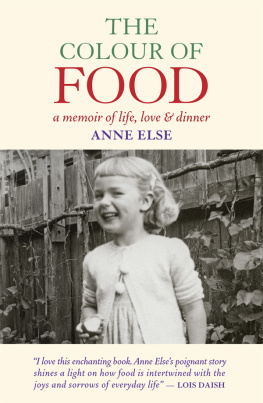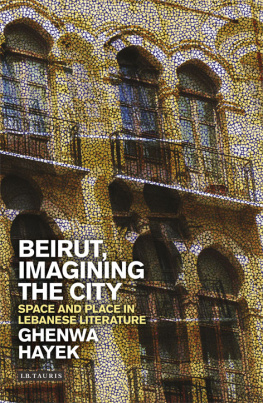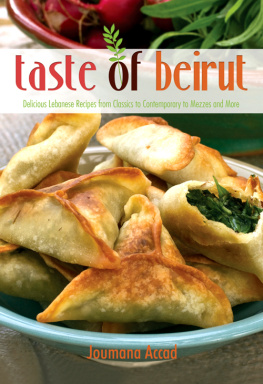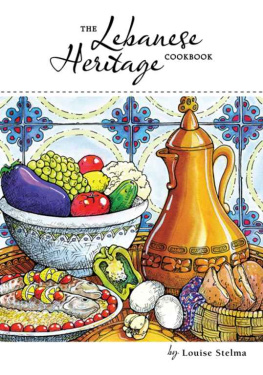

Free Press
A Division of Simon & Schuster, Inc.
1230 Avenue of the Americas
New York, NY 10020
www.SimonandSchuster.com
Copyright 2011 by Annia Ciezadlo
All rights reserved, including the right to reproduce this book or portions thereof in any form whatsoever. For information address Free Press Subsidiary Rights Department, 1230 Avenue of the Americas, New York, NY 10020
First Free Press hardcover edition February 2011
FREE PRESS and colophon are trademarks of Simon & Schuster, Inc.
The retellings of the Gilgamesh tales on pages 6970 and 150151 draw on both the Standard Version and the Old Babylonian tablets. Excerpts from The Epic of Gilgamesh translated by Maureen Gallery Kovacs. Copyright 1985, 1989 by the Board of Trustees of the Leland Stanford Jr. University. All rights reserved. Used with the permission of Stanford University Press, www.sup.org .
The Simon & Schuster Speakers Bureau can bring authors to your live event. For more information or to book an event contact the Simon & Schuster Speakers Bureau at 1-866-248-3049 or visit our website at www.simonspeakers.com .
Book design by Ellen R. Sasahara
Manufactured in the United States of America
1 3 5 7 9 10 8 6 4 2
Library of Congress Cataloging-in-Publication Data
Ciezadlo, Annia.
Day of honey: a memoir of food, love, and war/
Annia Ciezadlo.1st Free Press hardcover ed.
p. cm.
Includes bibliographical references and index. 1. Ciezadlo, Annia. 2. JournalistsIraqBaghdad. 3. JournalistsLebanonBeirut. 4. JournalistsUnited StatesBiography. 5. Baghdad (Iraq)Social life and customs. 6. Beirut (Lebanon)Social life and customs. 7. FoodSocial aspectsIraqBaghdad. 8. FoodSocial aspectsLebanonBeirut. 9. Iraq War, 2003Social aspects. I. Title.
PN4874.C5185A3 2011
070.92dc22
[B] 2010019739
ISBN 978-1-4165-8393-6
ISBN 978-1-4165-8422-3 (ebook)
For Mohamad
Contents

Day of honey, day of onions.
Arabic proverb
Much earlier in this century an Austrian journalist, Karl Kraus, pointed out that if you actually perceived the true reality behind the news you would run, screaming, into the streets. I have run screaming into the streets dozens of times but have always managed to return home in time for dinner.
Jim Harrison, The Raw and the Cooked: Adventures of a Roving Gourmand
PART I
New York
All great change in America begins at the dinner table.
Ronald Reagan
Introduction
The Siege
HE WAS ONE of an endangered species: among the few white, native-born cab drivers left in New York. Meaty, middle-aged, face like a potato. A Donegal tweed driving cap. He pulled up beside me, drew down the window, and growled out of the corner of his mouth: You wanna ride?
We rode in silence until we reached Atlantic Avenue. You see this street? he said, waving a massive hand at the windshield. Theyre all Arabs on this street.
He was right, more or less. The conquest began in the late 1800s, as the Ottoman Empire waned and the Mediterranean silk trade collapsed. Between 1899 and 1932, a little over 100,000 Syriansin those days, a catchall term for practically anyone from the Levant, the French name for the eastern Mediterraneanemigrated to the New World. Many of them settled in New York. In 1933, the Arab-American newspaper Syrian World described Atlantic Avenue, with gently sarcastic pride, as the principal habitat of the species Syrianica.
By 1998, the Atlantic Avenue strip was such a symbol of Arab-American identity that 20th Century Fox re-created it for a movie called The Siege. In the movie, Arab terrorists carry out a series of bombings in New York City, and the government imposes martial law and rounds up all the Arabs, guilty and innocent alike, into detention camps.
These Arabs, yeah, the cabbie continued. They come over here, they try to act normal. Try to act like you and me. Like theyre fitting in, ya know?
He barked out a laugh. Turns out theyre al-Qaeda.
It was a relief when people said it openly. I could talk to this guy. He was an ethnic American, and he assumed I was one too. He was right: Im a Polish-Greek-Scotch-Irish mutt from working-class Chicago. A product of stockyards and steel mills and secretarial schools. I could see where he was coming from. I came from there myself.
But then again: the man I loved was named for Islams prophet. We had been seeing each other for about five months. I had thought of him as just another ethnic American, but now it was September 13, 2001, and suddenly nobody else seemed to see it that way. On September 11, the landlady had knocked on his door just before midnight. Mrs. Scanlon was an immigrant herself, from Ireland, and no doubt with terrorism-related memories of her own. In a high and quavering voice, she asked, Mohamad, are you an Arab?
I had been thinking about The Siege quite a bit since then.
When 20th Century Fox started filming The Siege in the late 1990s, I had just moved to the heavily Polish Brooklyn neighborhood of Greenpoint. Apparently the real Atlantic Avenue didnt have enough brownstones to look like New York on film, so overnight, Hollywood set designers transformed Greenpoints Little Warsaw into a cinematic version of the Arab street. Awnings that had once read Obiady Polski (Polish Dinners) now surged with Arabic script. Tanks rolled past under klieg lights. Wandering down the imitation Atlantic Avenue, it was easy to imagine that all of our carefully constructed ethnic identities were nothing but Hollywood sets, as specious a notion as the species Syrianica, a scaffolding you could put up or tear down in a couple of hours.
The city had papered Greenpoints streetlights with flyers forbidding people to park because of Martial Law, the movies working title; as it happened, many Greenpointers had fled Poland in the early 1980s, when it was under actual Communist martial law. Middle-aged Polish migrs would stop and glower at the Hollywood diktats with gloomy satisfaction: You see? I told you it would happen here too.
Back in September 2001, red and yellow traffic lights flowed over the dark windshield. The few cars ghosting down the empty avenue ignored them. Everyone ran red lights during the days after the attacks. Stopping seemed pointless, like everything else.
No, man, thats not true, I said finally. A lot of the Arabs here left their countries because they werent al-Qaeda. A lot of them left to get away from those guys.
Al-Qaeda wouldnt have had much use for my Arab: hes a Shiite, at least by birth. But introducing the Sunni-Shiite divide seemed a little ambitious in this case. They left cause their countries were messed up, I said. The ones that are here are the ones that wanted to come to America.
He looked hard at me in the rearview mirror, his eyes flashing in the little strip of glass.
I sighed. You know, most of the Arabs here in the U.S. are actually Christians.
A cowardly argument. My own Arab was a Muslim, after all.
Shyeah! the cabbie spat. They act like theyre Christians. They
Next page








